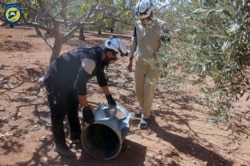A new report finds Syria to be the only country in the world still using cluster munitions, which are banned under an international treaty.
Syria remains the sole outlier in a world that is moving toward ridding itself of cluster munitions. The Cluster Munition Coalition is calling on the Syrian government to immediately stop using these inhumane weapons and says its Russian ally must refrain from being complicit in their use.
Human Rights Watch Advocacy Director Mary Wareham said most of the cluster munitions attacks last year were in Idlib governorate. Syrian forces are waging a fierce battle to reclaim this last rebel stronghold.
Wareham told VOA Russia has been assisting Syria in its military operations for the last few years. While it may not be directly involved in the attacks, she said Russia is enabling the Syrian government in these nefarious acts.
“We know that cluster munitions have been loaded onto planes at Russia’s airbase in Syria. That Russia has assisted the Syrian government in the use of cluster munitions. They have not really denied using cluster munitions, but they have not straight out admitted to supporting the Syrian government to use cluster munitions," she said.
Wareham said the vast majority of cluster munitions used in Syria have been manufactured in the Soviet Union or in Russia in past decades. On a more positive note, she said the Monitor could not find evidence of the continued use of cluster bombs in Yemen.
“The last attacks that Cluster Munition Monitor documented were in early 2017 by the Saudi-led coalition. I think that shows that the stigma against cluster munitions is sticking and even countries outside the Convention can be influenced by what it says in terms of prohibiting cluster munitions.”
Wareham said Saudi Arabia does not produce cluster munitions but has received them, most notably from the United States and also Brazil and Britain. She said the U.S. has not produced these weapons in the past year.
To date, 106 countries have joined the Convention on Cluster Munitions. Major holdouts include China, Russia, the United States, India, Pakistan, Iran and Israel.
The report finds States Parties to the Convention have destroyed 99 percent of their stockpiles or nearly 1.5 million cluster munitions and more than 178 million submunitions. Last year, it recorded 149 casualties, a significant decrease from previous years. The vast majority of casualties were civilians, not military.





